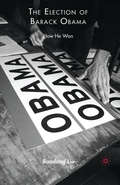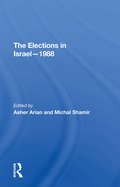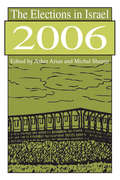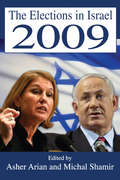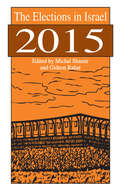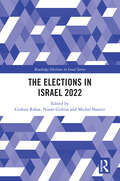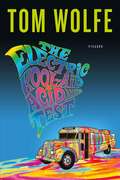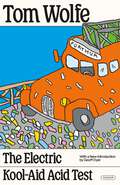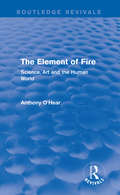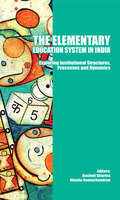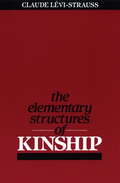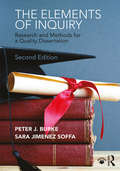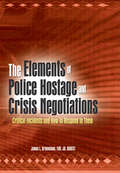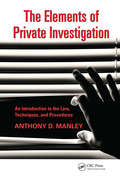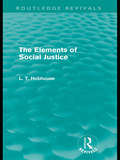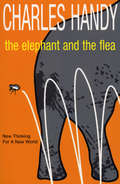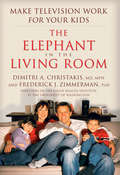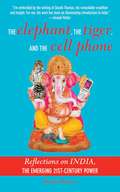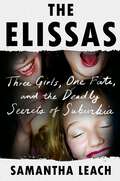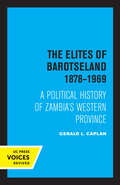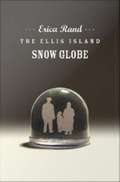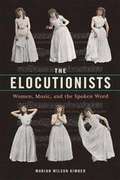- Table View
- List View
The Election of Barack Obama
by Baodong LiuThe historic election of Barack Obama, the first African-American president is analyzed from the perspective of racial relations. To trace the effect of time, Liu links Obama's multiracial winning coalition to the two-party system and the profound impact of racial changes since 1965.
The Elections In Israel--1988
by Michal Shamir Asher ArianForty years after becoming an independent state, Israel is still involved in deadly strife with many of its Arab neighbors and with the Palestinians under its military control. The protracted Arab-Israeli conflict is one of the most fundamental features of the Israeli experience; it overshadows economic and social decisions, and often sets the poli
The Elections in Israel 2003
by Michal ShamirThe Elections in Israel--2003 brings together leading Israeli and North American social scientists and their state-of-the-art, in-depth analysis of the 2003 Israeli national elections. These elections returned Ariel Sharon and the Likud to power amid one of the bloodiest rounds of conflict between Israel and the Palestinians and a severe economic downturn in Israel. Contributors analyze the electoral behavior of the voters as a whole and various subgroups, highlighting social cleavages and identity, as well as issues and other strategic considerations. Three chapters analyze in detail the Arab, the national-religious, and the "Russian" vote. The 2003 elections saw Israel's return to the family of parliamentary nations after it experimented with the direct election of the prime minister from 1996 through 2001. The impact of the adoption and repeal of this unique Israeli system of government is another major topic covered in this volume, and several contributions explore the impact of these changes upon the electorate, the party system, and party financing. Other unusual features of the 2003 elections were the low turnout levels among Jewish and Arab voters; political moves to disqualify Arab candidates and lists from running for office, which were overruled by the Supreme Court of Israel; the collapse of the left, the spectacular showing of the centrist Shinui party, and the dominant status of the Likud in the Knesset and in Israeli politics. Through its focus on the 2003 elections, this volume also illuminates developments and changes in Israeli society and politics. Many of these developments--multiculturalism, changes in social stratification, the growing role of the judiciary and of the media, and political reforms--characterize other Western democracies as well, and these are discussed from a comparative perspective. The Elections in Israel--2003 will be of particular interest to those concerned with politics in Israel as well as those concerned with comparative politics and elections in general.
The Elections in Israel 2006
by Michal Shamir Asher ArianSeveral dramatic events preceded the elections to the Seventeenth Knesset on March 28, 2006, beginning with the unilateral withdrawal from Gaza in August 2005 and its attendant and unprecedented removal of Jewish settlements and settlers, followed by major shifts among and within the various political parties. Most dramatic was the split in Likud when Prime Minister Ariel Sharon decided to form a new party, Kadima, leading to the breakup of the Likud party that Sharon had formed in 1973. This volume charts the 2006 elections.
The Elections in Israel 2009
by Michal ShamirThe elections to the 18th Knesset (legislature of Israel) were held on February 10, 2009, almost three years after the elections to the 17th Knesset and approximately twenty months before the original date set for them to be held. The elections are best understood in the context of the wars that were at each end of Ehud Olmert's government tenure, corruption scandals involving the prime minister, and the failure of Tzipi Livni, the newly elected head of the ruling center party, Kadima to form a new coalition following Olmert's resignation.The election campaign of 2009 began with the resignation of Ehud Olmert in the shadow of his corruption scandals and issues of integrity and clean government. This was followed by the world financial crisis, which directed attention towards the economic dimension and performance of the candidates. On the face of it, the campaign was cut short when military action began in Gaza. Still, the election was on the minds of candidates, and the question of who can best ensure security prevailed in the campaign. It becamepersonalized and focused on the candidates: the two candidates who had once headed the government and aspired to return, Benjamin Netanyahu and Ehud Barak, and the chairperson of Kadima, Tzipi Livni, who was running for the first time as head of a party.The Elections in Israel 2009 will be of particular interest to those concerned with comparative politics and elections in an open society. This volume is the latest in the series begun in 1969.
The Elections in Israel 2015 (Elections of Israel)
by Gideon Rahat Michal ShamirThe newest volume in the Elections in Israel series focuses on the twentieth Knesset elections held in March 2015 following the collapse of the third Netanyahu government. Prime Minister Benjamin Netanyahu’s main opposition party, the Zionist Camp, ran a negative personalized election campaign, assuming that Israelis had grown tired of him. Netanyahu, however, achieved a surprising and dramatic victory by enhancing and radicalizing the same identity politics strategies that helped him win in 1996. The Elections in Israel 2015 dissects these and other campaigns, from the perspective of the voters, the media and opinion polls, the political parties, and electoral competition. Several contributors delve into the Left and Arab fear mongering Likud campaign, which produced strategic identity voting. Other contributions analyze in-depth the Israeli party and electoral systems, highlighting the exceptional decline of the mainstream parties and the adoption of a higher electoral threshold. Providing a close analysis of electoral competition, legitimacy struggles, stability and change in the voting behavior of various groups, partisanship, personalization and political polarization, this volume is a crucial record of Israeli political history.
The Elections in Israel 2022 (Elections of Israel)
by Gideon Rahat, Noam Gidron and Michal ShamirThe 2022 Israeli elections stand out as a turning point in the country’s political history. Following a period of unprecedented political instability, the right-wing government formed following the elections—Benjamin Netanyahu's sixth government—was the most radical in Israel’s history.This book examines the 2022 Israeli elections through various theoretical perspectives and diverse research designs and data sources. The first part scrutinizes various aspects of Israeli democracy related to the elections. These include ideological and affective polarization, cleavages, voter turnout, involvement of citizens and civil organizations in election campaigns and the nature of the government that was established following the elections. The second part of the book presents studies of parties that participated in the elections: those that declined (Labor), those that ascended (Religious Zionism and Otzma Yehudit), and those that ascertained their power (United Torah Judaism and Shas). A valuable addition to the Elections in Israel series, the book—written by leading scholars of Israeli politics and society—touches on key themes, including political personalization, polarization, populism, the radical right, party decline and adaptation and democratic backsliding.The book will be of particular interest to students and researchers of Israeli politics and society—especially relating to the events of 2023 and the war in Gaza—as well as to social scientists interested in these political phenomena and their effects on democratic countries worldwide.
The Electric Kool-Aid Acid Test
by Tom WolfeWolfe takes a walk on the wild side with Ken Kesey and his Merry Pranksters and writes about the 1960s hippie culture.
The Electric Kool-Aid Acid Test
by Tom WolfeOne of the most essential works on the 1960s counterculture, Tom Wolfe's The Electric Kool-Aid Test ushered in an era of New Journalism. This is the seminal work on the hippie culture, a report on what it was like to follow along with Ken Kesey and the Merry Pranksters as they launched the "Transcontinental Bus Tour" from the West Coast to New York, all while introducing acid (then legal) to hundreds of like-minded folks, staging impromptu jam sessions, dodging the Feds, and meeting some of the most revolutionary figures of the day."An American classic" (Newsweek) that defined a generation. "An astonishing book" (The New York Times Book Review) and an unflinching portrait of Ken Kesey, his Merry Pranksters, LSD, and the psychedelic 1960s.
The Element of Fire: Science, Art and the Human World (Routledge Revivals)
by Anthony O'HearFirst published in 1988, the aim of this book can be stated in Nietzsche’s words: ‘To look at science from the perspective of the artist, but at art from that of life’. The title contests the notions that science alone can provide us with the most objective truth about the world, and that artistic endeavour can produce nothing more valuable than entertainment. O’Hear argues that art and the study of art are not indispensable aspects of human life, and that this is equally as important as the investigation of the natural world.
The Elementary Education System in India: Exploring Institutional Structures, Processes and Dynamics
by Rashmi Sharma Vimala RamachandranThis book focuses on the failure of elementary education since Independence, which is usually seen as the result of simplified phrases like 'lack of political will', 'because of poverty', etc. This book looks at the system as a whole: infrastructure, quality of teaching, privatisation, nutritional incentives, curriculum. It contains samples from two states namely Rajasthan and Andhra Pradesh.
The Elementary Structures of Kinship
by Claude Levi-StraussProfessor Lévi-Strauss's first major work, Les Structures élémentaires de la Parenté, has acquired a classic reputation since its original publication in 1949; and it has become the constant focus of academic debate about central theoretical concerns in social anthropology. It is, however, a long and difficult book for many students to read in French, and its arguments have consequently become known, even among professional anthropologists, largely through critical analysis. It was republished in a revised French edition in 1967 with a new foreword by the author, and it is this text with his further emendations that has been used in this translation.Lévi-Strauss applies his intellectual powers to the perennial problem of incest, which he elucidates by means of the concept of exchange as formulated by Marcel Mauss in his famous analysis of the gift (Essai sur le don, 1925). He distinguishes two elementary modes of exchange which govern not only the conventional variety of goods and services but also the transfer of women in marriage: these are "restricted" and "generalized" exchange. With a mass of ethnographic evidence he demonstrates how the formidable intricacy of marriage customs, comprising moral and jural ideas and institutions (which appear to be essentially arbitrary), can be seen as local and historical rules of exchange.Charles Lévi-Strauss traces these rules throughout a vast range of simple societies, chiefly in Australia and mainland Southeast Asia but also in the Americas, in Oceania, and in other parts of the world. To this survey he adds two extended sections on the great civilizations of China and India. He continues with a briefer consideration of the passage from elementary to complex structures, with particular reference to African societies, and concludes with a stimulating chapter on the principles of kinship, exchange as the universal basis for marriage prohibitions, and the formal relations between the sexes as part of a universe of communication.Although much of the work is technical, consisting of detailed analyses of types of social organization with which social anthropologists will be most familiar, it also contains much that will be of interest to psychologists, linguists, and philosophers, and to all who are interested in the possibility and the technique of the structural analysis of human activity. After the successes, moreover, of Lévi-Strauss's subsequent books--notably Structural Anthropology, Tristes Tropiques, Totemism, and The Savage Mind--this new edition of the work which founded his present outstanding reputation will have additional value as a further means of contact with one of the original minds of this century.The translation has been made by James Harle Bell and John Richard von Sturmer, of the University of New England, Australia, and by Rodney Needham, of the University of Oxford. Dr. Needham also acted as general editor and supplied the work with a new general index. He is the translator of Lévi-Strauss's Le Totemisme aujourd'hui and author of Structure and Sentiment (1962) and numerous papers which have contributed to the recognition of Professor Lévi-Strauss's work in the English-speaking world.
The Elements of Inquiry: Research and Methods for a Quality Dissertation
by Peter J. Burke Sara Jimenez SoffaThe Elements of Inquiry covers the basic guidelines for graduate students doing an investigation or inquiry project. It distils the rubrics necessary for teaching research methods and completing research projects, and gives the student researcher a list of steps to follow to complete any type of inquiry project – including formal research projects such as doctoral dissertations. It was written to support the work of students in an educational leadership doctoral program, but it will also assist the research efforts of college students at any level in any discipline. The book begins by establishing the underlying philosophical concepts upon which all good research is based, preparing students to get down to the "nuts and bolts" of conducting their own research and evaluating the research of others. Fundamental concepts and rules of research are explained both for producers and consumers of social science and educational research. Numerous practical examples illustrate the steps in the research process presented in the text. There are end-of-chapter exercises for students to apply the concepts discussed in the chapter. Templates for organizing and presenting research provide students with a game plan for success with their research. The book ends with an up-to-date annotated bibliography of beginning and advanced research texts allowing students easy access to books that detail the more specialized research topics. While most research books detail one or more method in depth, this text provides a broad introduction to many techniques and models used in doctoral dissertations, and will be of particular value to those who are consumers of inquiry studies and research reports. Key to the overview provided is the annotated bibliography that leads the reader to the next stage of understanding or doing research.
The Elements of Police Hostage and Crisis Negotiations: Critical Incidents and How to Respond to Them
by James L GreenstoneRun a safe and successful crisis negotiation-from start to finish! The Elements of Police Hostage and Crisis Negotiations: Critical Incidents and How to Respond to Them reduces the negotiation procedures for hostage, barricaded, and suicide incidents to their basic elements, providing quick and easy access to the information you need-from the initial call-out to the final debriefing. Based on field-tested principles proven to work, the book also includes newly developed and highly specialized techniques for more experienced negotiators. Author James L. Greenstone provides a user-friendly, step-by-step guide to the intervention and negotiation process that will help you get the job done-right. Designed for day-to-day, on-the-scene use, The Elements of Police Hostage and Crisis Negotiations is a practical handbook for experienced professionals and novices that can also be used as a supplementary textbook for criminal justice, crisis intervention, and psychology coursework. Each chapter contains useful checklists, procedural notes, tables, strategy worksheets, and forms, and the book includes special indices for quick reference in addition to a traditional index. Dr. Greenstone, a police mental health consultant and psychologist who served as Director of the Psychological Services Unit of the Fort Worth Police Department in Texas, uses a simple and direct format that emphasizes procedures, action and results, leaving theoretical discussions for another time and place. The book examines the negotiation process from start to finish, including preincident preparations, first response responsibilities, responding to the call-out, arriving at the scene, preparing to negotiate, making contact, preparing for the surrender, post-incident tasks, preparing equipment, and more. Topics covered in The Elements of Police Hostage and Crisis Negotiations include: legal considerations telephone surveillance guidelines the Stockholm Syndrome working with S.W.A.T. and Tactical Emergency Medical Support dealing with the media recognizing "red flags" the issues of suicide debriefing the hostage team the 150 laws of hostage and crisis negotiation and the 10 most serious errors a negotiator can make The Elements of Police Hostage and Crisis Negotiations: Critical Incidents and How to Respond to Them is a practical guide that&’s equally effective in the field, in training, and in the office.
The Elements of Private Investigation: An Introduction to the Law, Techniques, and Procedures
by Anthony ManleyIn today‘s increasingly litigious society, the threat of a private investigator (PI) being hit with a civil lawsuit or even criminal charges is very real. Keeping up with the multitude of laws that impact what investigators can and can‘t do can be daunting but could prove very costly if ignored.Emphasizing legal and liability issues, The Elements o
The Elements of Social Justice (Routledge Revivals)
by L. T. HobhouseFirst published in 1922, this title written by L. T. Hobhouse, British politician and one of the leading theorists of Social Liberalism, is a seminal work concerning the social application of ethical principles for the common good. The object of the book is to show that social and political institutions are not ends in themselves. Hobhouse argues that the social ideal is to be sought not in the faultless unchanging system of an institutional Utopia, but in the love of a spiritual life with its unfailing system of harmonious growth unconfined.
The Elephant And The Flea
by Charles HandyBookseller Charles Handy's best-selling new book looks at how individuals (the fleas in his analogy) relate to multi-national conglomerates (the elephants). In addition to addressing how and why we work today, he covers a wide range of preoccupations and issues including the increasing fear of big business: 'it is easy to see why many observers think that the big corporations are now both richer and more powerful than many nation states. They worry that these new corporate states are accountable to no-one - that their financial clout makes governments beholden to them ... The elephants, people feel, are out of control.'
The Elephant In The Living Room: Make Television Work for Your Kids
by Dimitri A. Christakis Federick J. ZimmermanThe nation's top child development experts examine the effects of television on children and their groundbreaking research will startle manyTelevision is the "elephant in the living room" of our culture. American children watch television an average of 3 hours per day, and many parents sheepishly concede that they rely on television as an electronic babysitter. But TV is not necessarily harmful to kids. The authors present groundbreaking scientific evidence that television can be a powerful and effective tool—for entertainment, for education, and for socialization. The secret is for parents to learn how to use television as a tool, not a crutch. With a detailed explanation of the effects of television viewing on kids' emotional, mental, and physical development, plus tips to enable parents to act on this new knowledge, they'll soon be able to turn TV into a positive force in their child's life. The authors share:• which popular shows increase your child's reading ability—and which may delay speech development• which televised sports boost girls' self-image—and which ones could cause eating disorders• the best and worst programming for every age, from toddler to teen
The Elephant, The Tiger, and the Cellphone: Reflections on India, the Emerging 21st-Century Power
by Shashi TharoorInterest in India has never been greater. Here Shashi Tharoor, one of the subcontinent's most respected writers and diplomats, offers precious insights into this complex, multifaceted land, which despite its dazzling diversity of languages, customs, and cultures remains-more than sixty years after its founding-the world's largest democracy. He describes the vast changes that have transformed this once sleeping giant into a world leader in science and technology, a nation once poverty-stricken that now boasts a middle class of over 300 million people-as large as the entire population of the United States. Artfully combining hard facts and statistics with opinion and observation, Tharoor discusses the strengths and weaknesses of his rapidly evolving homeland in five areas-politics, economics, culture, society, and sports-and takes a fresh look at the world's oldest civilizations and most populous countries.
The Elissas: Three Girls, One Fate, and the Deadly Secrets of Suburbia
by Samantha LeachAmazon's Best Nonfiction Book of the Month for June 2023Nylon's "June 2023's Must-Read Book Releases"Pure Wow&’s &“11 Books We Can&’t Wait to Read in June&”The Skimm&’s &“17 of Our Favorite Books Coming Out This Summer&”Glamour&’s &“15 Best Nonfiction Books of 2023, So Far&”Bustle&’s &“Most Anticipated Books Of Spring & Summer 2023&”Harper&’s Bazaar&’s &“23 Best Summer Beach Reads of 2023&”Zibby Mag&’s &“Most Anticipated Spring and Summer Books&” A New York Post Best Books of the Week selectionThree suburban girls meet at a boarding school for troubled teens.Eight years later, they were dead.Bustle editor Samantha Leach and her childhood best friend, Elissa, met as infants in the suburbs of Providence, Rhode Island, where they attended nursery, elementary school, and temple together. As seventh graders, they would steal drinks from bar mitzvahs and have boys over in Samantha&’s basement—innocent, early acts of rebellion. But after one of their shared acts, Samantha was given a disciplinary warning by their private school while Elissa was dismissed altogether, and later sent away. Samantha did not know then, but Elissa had just become one of the fifty-thousand-plus kids per year who enter the Troubled Teen Industry: a network of unregulated programs meant to reform wealthy, wayward youth. Less than a year after graduation from Ponca Pines Academy, Elissa died at eighteen years old. In Samantha&’s grief, she fixated on Elissa&’s last years at the therapeutic boarding school, eager to understand why their paths diverged. As she spoke to mutual friends and scoured social media pages, Samantha learned of Alyssa and Alissa, Elissa&’s closest friends at the school who shared both her name and penchant for partying, where drugs and alcohol became their norm. The matching Save Our Souls tattoo all three girls also had further fueled Samantha&’s fixation, as she watched their lives play out online. Four years after Elissa&’s death, Alyssa died, then Alissa at twenty-six. In The Elissas, Samantha endeavors to understand why they ultimately met a shared, tragic fate that she was spared, in turn, offering a chilling account of the secret lives of young suburban women.
The Elites of Barotseland 1878-1969: A Political History of Zambia's Western Province
by Gerald L. CaplanThis title is part of UC Press's Voices Revived program, which commemorates University of California Press’s mission to seek out and cultivate the brightest minds and give them voice, reach, and impact. Drawing on a backlist dating to 1893, Voices Revived makes high-quality, peer-reviewed scholarship accessible once again using print-on-demand technology. This title was originally published in 1970.
The Elizabethan World (Routledge Worlds)
by Susan Doran and Norman JonesThis comprehensive and beautifully illustrated collection of essays conveys a vivid picture of a fascinating and hugely significant period in history. Featuring contributions from thirty-eight international scholars, the book takes a thematic approach to a period which saw the defeat of the Spanish Armada, the explorations of Francis Drake and Walter Ralegh, the establishment of the Protestant Church, the flourishing of commercial theatre and the works of Edmund Spencer, Philip Sidney and William Shakespeare. Encompassing social, political, cultural, religious and economic history, and crossing several disciplines, The Elizabethan World depicts a time of transformation, and a world order in transition. Topics covered include central and local government; political ideas; censorship and propaganda; parliament, the Protestant Church, the Catholic community; social hierarchies; women; the family and household; popular culture, commerce and consumption; urban and rural economies; theatre; art; architecture; intellectual developments ; exploration and imperialism; Ireland, and the Elizabethan wars. The volume conveys a vivid picture of how politics, religion, popular culture, the world of work and social practices fit together in an exciting world of change, and will be invaluable reading for all students and scholars of the Elizabethan period.
The Ellis Island Quiz Book
by Barry MorenoA multiple-choice quiz that teaches you everything you need to know about the immigrant experience at America’s “Golden Door.” Have you ever wondered what it was like to journey across the ocean and disembark at Ellis Island? How would you earn a living? How would you have lived during your time at sea? Find the answers through the quizzes in this book, which cover topics like famous immigrants, the ocean crossing and Ellis Island in popular culture. The questions are designed to be challenging for young students and adults alike and are as fun as they are educational. Discover Ellis Island, immigration history and what it was like to be an immigrant.
The Ellis Island Snow Globe
by Erica RandIn The Ellis Island Snow Globe, Erica Rand, author of the smart and entertaining book Barbie's Queer Accessories, takes readers on an unconventional tour of Ellis Island, the migration station turned heritage museum, and its neighbor, the Statue of Liberty. By pausing to reflect on what is and is not on display at these two iconic national monuments, Rand focuses attention on whose heritage is honored and whose obscured. She also reveals the shifting connections between sex, money, material products, and ideas of the nation in everything from the ostensible father-mother-child configuration on an Ellis Island golf ball purchased at the gift shop to the multi-million dollar July 4, 1986 Liberty Weekend extravaganza celebrating the Statue's centennial just days after the Supreme Court's un-Libertylike decision upholding the antisodomy laws challenged in Bowers v. Hardwick. Rand notes that portrayals of the Statue of Liberty as a beacon for immigrants tend to suppress the Statue's connections to people brought to this country by force. She examines what happened to migrants at Ellis Island whose bodies did not match the gender suggested by the clothing they wore. In light of contemporary ideas about safety and security, she examines the "Decide an Immigrant's Fate" program, which has visitors to Ellis Island act as a 1910 board of inspectors hearing the appeal of an immigrant about to be excluded from the country. Rand is a witty, insightful, and open-minded tour guide, able to synthesize numerous diverse ideas--about tourism, immigration history, sexuality, race, ethnicity, commodity culture, and global capitalism--and to candidly convey her delight in her Ellis Island snow globe. And pen. And lighter. And back scratcher. And golf ball. And glittery pink key chain.
The Elocutionists: Women, Music, and the Spoken Word
by Marian Wilson KimberEmerging in the 1850s, elocutionists recited poetry or drama with music to create a new type of performance. The genre--dominated by women--achieved remarkable popularity. Yet the elocutionists and their art fell into total obscurity during the twentieth century. Marian Wilson Kimber restores elocution with music to its rightful place in performance history. Gazing through the lenses of gender and genre, Wilson Kimber argues that these female artists transgressed the previous boundaries between private and public domains. Their performances advocated for female agency while also contributing to a new social construction of gender. Elocutionists, proud purveyors of wholesome entertainment, pointedly contrasted their "acceptable" feminine attributes against those of morally suspect actresses. As Wilson Kimber shows, their influence far outlived their heyday. Women, the primary composers of melodramatic compositions, did nothing less than create a tradition that helped shape the history of American music.
